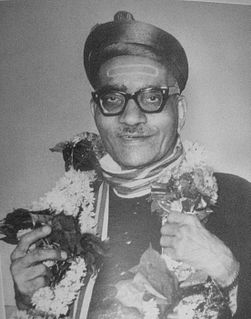Related Research Articles

Lakshmibai, the Rani of Jhansi, was the Maharani consort of the Maratha princely state of Jhansi from 1843 to 1853 as the wife of Maharaja Gangadhar Rao. She was one of the leading figures of the Indian Rebellion of 1857 and became a symbol of resistance to the British Raj for Indian nationalists. She died in the Rebellion, wounded and killed in a battle on 18 June 1858. The Rebellion was suppressed by November that year.

The Bhandarkar Oriental Research Institute (BORI) is located in Pune, Maharashtra, India. It was founded on 6 July 1917 and named after Ramakrishna Gopal Bhandarkar (1837–1925), long regarded as the founder of Indology (Orientalism) in India. The institute is well known for its collection of old Sanskrit and Prakrit manuscripts.

Vishnu Vāman Shirwādkar, popularly known by his pen name, Kusumāgraj, also known as Vi. Vā. Shirwadkar, was an eminent Marathi poet, playwright, novelist, short story writer, apart from being a humanist, who wrote of freedom, justice and emancipation of the deprived, In a career spanning five decades starting in pre-independence era, he wrote 16 volumes of poems, three novels, eight volumes of short stories, seven volumes of essays, 18 plays and six one-act plays. His works like the Vishakha (1942), a collection of lyrics, inspired a generation into the Indian freedom movement, and is today considered one of the masterpieces of Indian literature, apart from his play, Natsamrat, which has an important place in Marathi literature. He was the recipient of several State awards, and National awards including the 1974 Sahitya Akademi Award in Marathi for Natsamrat, Padma Bhushan (1991) and the Jnanapith Award in 1987; he also served as the President of the Akhil Bharatiya Marathi Sahitya Sammelan held at Margao in 1964.

The Chitpavan Brahmin or Konkanastha Brahmin is a Hindu Maharashtrian Brahmin community inhabiting Konkan, the coastal region of the state of Maharashtra. The community came into prominence during the 18th century when the heirs of Peshwa from the Bhat family of Balaji Vishwanath became the de facto rulers of the Maratha empire. Under the British Raj, they were the one of the Hindu communities in Maharashtra to flock to western education and they provided the bulk of social reformers, educationalists and nationalists of the late 19th century. Until the 18th century, the Chitpavans were held in low esteem by the Deshastha, the older established Brahmin community of Maharashtra region.
Narayan Vaman Tilak was a Marathi poet from the Konkan region of then Bombay Presidency in British India, and a famous convert to Christianity from Chitpavan Brahmin Community.
The Central India Campaign was one of the last series of actions in the Indian rebellion of 1857. A small British and Indian Army overcame a disunited collection of states in a single rapid campaign, although determined rebels continued a guerrilla campaign until the spring of 1859.

Tryambak Shankar Shejwalkar was an award-winning historian and essayist.

Dattatray Vaman Potdar, better known as Datto Vaman Potdar, was an Indian historian, writer, and orator. He was the Vice-Chancellor of University of Pune during 1961 - 1964.
Vyankatesh Digambar Madgulkar was one of the most popular Marathi writers of his time. He became well-known mainly for his realistic writings about village life in a part of southern Maharashtra called Maandesh, set in a period of 15 to 20 years before and after Independence. He was often called Tatya by his admirers, friends and family.

Vishwanath Kashinath Rajwade, popularly known as Itihasacharya Rajwade, was a historian, scholar, writer, commentator and orator from Maharashtra, India. He is considered to be the first in real sense to undertake an immense research of Maratha history by visiting hundreds of villages and historical places all over India and gathering thousands of historical papers. He was also a commentator on various aspects of world history. He was the founder member of Itihas Sanshodhak Mandal, Pune. His students include historians like Datto Vaman Potdar, Vasudeo Sitaram Bendrey and G. H. Khare.
Adnyapatra, also pronounced as ‘Ajnapatra’, is a royal edict on the principles of Maratha policy written in Modi Marathi by Ramchandra Pant Amatya, who served on the Council of 8 as the Finance Minister (Amatya) to Maratha King Shivaji, with intention to guide Shivaji’s grandson Sambhaji II. It is supposed to be the formal documentation of Shivaji’s ideals, principles and policies of state administration.

Bharat Itihas Sanshodhak Mandal, popularly known as Itihas Sanshodhak Mandal or just ‘Mandal’, is an Indian institute providing resources and training for historical researchers. It is located at Pune in Maharashtra state. The institute was founded in 1910 by the veteran Indian historian Vishwanath Kashinath Rajwade and Sardar K. C. Mehendale.
Vishnubhat Godse (1827-1904) was an Indian traveller and a Marathi writer. Godse is best known for his travelogue Majha Pravas, which is notable for the description of his "true and unique" experiences of the First War of Independence of 1857 during his travels in North India. It is one of the earliest travelogues written in the Marathi language.

Jhansi was an independent princely state ruled by the Maratha Newalkar dynasty under suzerainty of British India from 1804 till 1853, when the British authorities took over the State under the terms of the Doctrine of Lapse. Before that it was under the Peshwas from 1728 to 1804. The fortified town of Jhansi served as its capital.
Nilesh Moharir is an Indian music director. He composed several songs in Marathi. He has composed around 46 title tracks, 15 non-film music albums and 8 movies in Marathi. He is known for his catchy melodious music composition.
References
- ↑ Vishnubhat ki Aatmkatha (Autobiography of Vishnubhat) (in Hindi). Retrieved March 21, 2010.
- ↑ Godse, Vishnubhat, Maza Pravas: 1857 chya Bandaci Hakikat, ed. Datto Vaman Potdar, (Pune: Venus Prakashan, 1974).